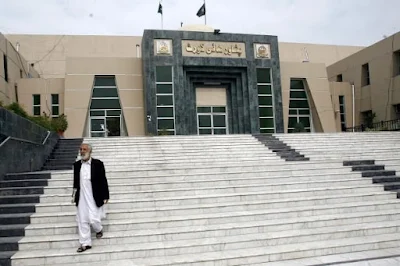The Peshawar High Court (PHC) rejected on Thursday the Sunni Ittehad Council’s (SIC) plea challenging the Election Commission of Pakistan’s (ECP) decision to allocate reserved seats for women and minorities in the National Assembly and provincial legislatures meant for it to other parties.
In a 4-1 majority verdict, the ECP, on March 4, dashed the PTI-backed SIC's hopes for a seat quota, citing "non-curable legal defects" and a violation of mandatory provisions in submitting party lists for reserved seats.
The plea was heard by a five-member bench consisting of Justice Ishtiaq Ibrahim, Justice Ijaz Anwar, Justice SM Atiq Shah, Justice Shakeel Ahmed, and Justice Syed Arshad Ali.
On January 13, the Supreme Court issued an order that came with profound consequences, as the apex court declared PTI's intra-party elections illegal, leaving the party deprived of its election symbol. This compelled the PTI candidates to contest the February 8 general elections as independents, and losing the opportunity to claim reserved seats.
A day earlier, Attorney General for Pakistan (AGP) Mansoor Usman Awan informed the PHC bench that the SIC did not contest the February 8 general elections, hence, it could not be allotted the reserved seats as per the law.
Representing the petitioner, Qazi Mohammad Anwar Advocate informed the court that senior lawyers Barrister Ali Zafar and Babar Awan would present arguments. Meanwhile, Anwar provided background information on the case.
Justice Ibrahim inquired whether any SIC candidate was successful in the February 8 election, to which Anwar replied in the negative. Justice Arshad noted that even the SIC chairman contested the election as an independent candidate.
Subsequently, the court directed AGP Awan to present his arguments. The AGP defended the ECP's decision, stating that the SIC had not submitted any list for the allocation of reserved seats before the election, which was a mandatory requirement under the law.
Responding to a query about redistributing the seats to other parties if not allocated to the SIC, the AGP asserted that parliament would be incomplete without the allocation of those seats, emphasizing the importance of representation for women and minorities.
Yesterday, Attorney General for Pakistan Mansoor Usman Awan and the counsels for the PPP and ECP had completed their arguments.
AGP Awan had argued that a political party could get reserved seats only if it won a general one. ECP lawyer Sikander Basheer Momand had supported his arguments, stating that the SIC was a political party but not a parliamentary one.
Today, the bench — led by Justice Ishtiaq Ibrahim and including Justices Ijaz Anwar, S.M. Attique Shah, Shakeel Ahmed and Syed Arshad Ali — resumed hearing the case.
PTI’s Ali Zafar appeared as the counsel for the SIC and completed his arguments, following which the court reserved its verdict.

